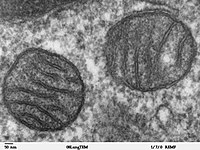
Photo from wikipedia
Mitochondria maintained a genome during evolution to synthesize core subunits of the oxidative phosphorylation system. Expression of the mitochondrial genome requires intraorganellar replication, transcription, and translation. Membrane-associated ribosomes translate mitochondrial-encoded… Click to show full abstract
Mitochondria maintained a genome during evolution to synthesize core subunits of the oxidative phosphorylation system. Expression of the mitochondrial genome requires intraorganellar replication, transcription, and translation. Membrane-associated ribosomes translate mitochondrial-encoded proteins and facilitate co-translational insertion of newly synthesized polypeptides into the inner membrane. Considering that mitochondrial-encoded proteins assemble with imported, nuclear-encoded proteins into enzyme complexes of the oxidative phosphorylation system, it is expected that expression of mitochondrial genes should adapt to the availability of their nuclear-encoded partners. Recent work shows that mitochondrial translation is influenced by the cellular environment. We discuss how mitochondrial translation is affected by the cellular environment and propose models of translational plasticity that modulate mitochondrial translation in response to the availability of imported proteins.
Journal Title: Trends in cell biology
Year Published: 2017
Link to full text (if available)
Share on Social Media: Sign Up to like & get
recommendations!